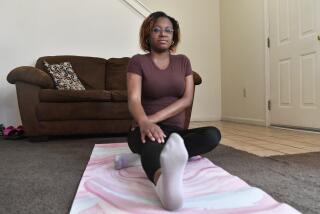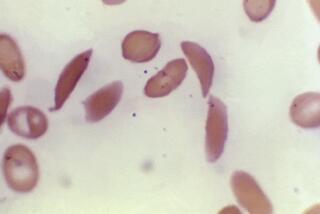Use of Unproven Gene Therapy OKd by U.S. for Tumor Patient : Medicine: The unprecedented federal decision will allow treatment of a dying San Diego womanâs brain cancer.
SAN DIEGO â Doctors say they have received unprecedented federal approval for âcompassionate useâ of an unproven gene therapy on a woman dying of a brain tumor.
Dr. Ivor Royston, scientific director of the San Diego Regional Cancer Center, said he plans to start the treatments Monday after researchers prepare genetically altered cells to be injected into the patient.
Researchers hope the cells will stimulate a natural immune response to attack the cancer, which the womanâs doctors describe as a virulent type of glioblastoma that is uniformly fatal.
The 51-year-old woman has undergone brain surgery twice, including the removal of her entire right temporal lobe, three rounds of chemotherapy, radiation therapy, and an experimental treatment with radioactive monoclonal antibodies at Duke University, all without success. She is thought to have only weeks to live. Her husband, a San Diego businessman, has asked that she remain anonymous to preserve the familyâs privacy.
Royston received a letter by fax Monday from Dr. Lance Liotta, deputy director of the National Institutes of Health, informing him that agency director Dr. Bernadine Healy had consented to the unproven gene-therapy procedure.
Tom Flavin, a spokesman for Healy, said that because the procedure was considered safe--and the Food and Drug Administration concurred--the NIH decided âthat we would go ahead and give approval for this therapy to be given.â
The NIH had previously rejected Roystonâs application for a clinical trial of the technique because he had not shown it to be effective in animals, but Royston said it is worth the try anyway.
âThis is what we wanted all along,â he said.
Some members of the NIH Recombinant DNA Advisory Committee have expressed concern that premature use of unproven therapies could expose patients to unwarranted emotional harm or other risks.
Healy reversed her earlier stated opposition to the compassionate waiver after a meeting Monday with senior officials from the NIH, FDA and the U.S. Department of Health and Human Services, which oversees both health agencies, the patientâs husband said.
Royston and his colleague, Dr. Robert Sobol, plan to remove tumor cells from the woman and add to them the gene for an anti-tumor agent called interleukin 2. They hope that infusion of the cells back into her body will stimulate her immune system to attack the engineered cells and other tumor cells through what is called a âbystander effect.â
The first injection involving about a half-million cells is scheduled to be administered at Sharp Memorial Hospital in La Jolla, where the womanâs primary physician is on staff, Royston said.
She will receive progressively larger injections in her arm about every two weeks, and can be at home between treatments.
The case has received national attention because Sen. Tom Harkin (D-Iowa) approached Healy in October and asked that a compassionate waiver be granted for the woman, whose sister-in-law had worked in Harkinâs senatorial campaign. Harkin heads the Senate appropriations subcommittee that funds NIH. The patientâs husband has also served in four administrations, beginning with President John F. Kennedy.
Lorraine Voles, Harkinâs press secretary, said Tuesday that Harkin did not pressure Healy in any way into making this decision, and that he never even referred to the specific case in requesting that the NIH establish a mechanism for granting compassionate waivers. Voles acknowledged, however, that Harkin was responding to requests for help from the patientâs family.






